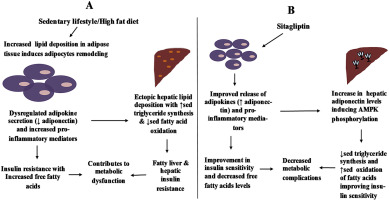Our official English website, www.x-mol.net, welcomes your feedback! (Note: you will need to create a separate account there.)
Amelioration of diet-induced metabolic syndrome and fatty liver with sitagliptin via regulation of adipose tissue inflammation and hepatic Adiponectin/AMPK levels in mice.
Biochimie ( IF 3.9 ) Pub Date : 2019-11-09 , DOI: 10.1016/j.biochi.2019.11.005 Swati Prakash 1 , Uddipak Rai 1 , Ramoji Kosuru 1 , Vinod Tiwari 1 , Sanjay Singh 2
Biochimie ( IF 3.9 ) Pub Date : 2019-11-09 , DOI: 10.1016/j.biochi.2019.11.005 Swati Prakash 1 , Uddipak Rai 1 , Ramoji Kosuru 1 , Vinod Tiwari 1 , Sanjay Singh 2
Affiliation

|
Chronic consumption of unhealthy diet and sedentary lifestyle induces fatty liver and metabolic complications. Adipocytes get overloaded with lipid succeeding low-grade inflammation and disrupting adipokine release. This research aims to investigate the effect of sitagliptin on white adipose tissue inflammation, adipokine level, metabolic syndrome, and fatty liver through 5' adenosine monophosphate-activated protein kinase (AMPK) pathway. In sixteen weeks of the experimental protocol, Swiss albino mice were kept in a standard environment and were fed 60% high-fat diet and 20% fructose water (HFFW) where they developed metabolic syndrome features, adipose tissue inflammation, and altered adipokine profile. Sitagliptin was administered for the last eight weeks. They were allocated to following six groups, control diet with regular water (1), HFFW only (2), HFFW and metformin 100 mg/kg (3), HFFW and sitagliptin 10 mg/kg (4), HFFW and sitagliptin 20 mg/kg (5), and HFFW and sitagliptin 30 mg/kg (6). Fasting serum insulin (FSI), glucagon-like peptide-1 (GLP-1), adipokines (adiponectin and leptin), serum lipid profile, hepatic lipid content, and white adipose tissue inflammation were assessed. Protein expression of P-AMPK, P-Acetyl co-a carboxylase (ACC), and mRNA expression of fatty acid metabolism genes were also evaluated in the liver. Sitagliptin significantly and effectively reversed metabolic syndrome complexity. FSI and GLP-1 levels were improved. A significant reduction in hepatic lipid content and oxidative stress was also observed. Also, sitagliptin significantly ameliorated adipose tissue inflammation and adiponectin levels at 20 mg/kg and 30 mg/kg. P-AMPK and P-ACC expression increased significantly. Moreover, expression of fatty acid synthesis genes was down-regulated, and fatty acid oxidation genes were up-regulated. Sitagliptin significantly ameliorated obesity-induced adipose tissue inflammation, metabolic syndrome, and fatty liver via regulation of adiponectin and AMPK levels in obese mice. Also, increased GLP-1 levels would have induced insulin-independent effects on adipose tissue and liver.
中文翻译:

西他列汀可通过调节小鼠脂肪组织炎症和肝脂联素/ AMPK水平来改善饮食诱发的代谢综合征和脂肪肝。
长期食用不健康的饮食和久坐的生活方式会诱发脂肪肝和代谢并发症。脂肪细胞脂质过多,继发轻度炎症并破坏脂肪因子释放。这项研究旨在通过5'腺苷单磷酸激活蛋白激酶(AMPK)途径研究西他列汀对白色脂肪组织炎症,脂肪因子水平,代谢综合征和脂肪肝的影响。在实验方案的十六周中,瑞士白化病小鼠被饲养在标准环境中,并饲喂60%的高脂饮食和20%的果糖水(HFFW),这些小鼠会出现新陈代谢综合症,脂肪组织炎症和脂肪因子变化。西他列汀在过去八周内服用。他们被分为以下六组,定期喝水控制饮食(1),仅HFFW(2),HFFW和二甲双胍100 mg / kg(3),HFFW和西他列汀10 mg / kg(4),HFFW和西他列汀20 mg / kg(5),HFFW和西他列汀30 mg / kg(6) 。评估了空腹血清胰岛素(FSI),胰高血糖素样肽-1(GLP-1),脂肪因子(脂联素和瘦素),血清脂质谱,肝脂质含量和白色脂肪组织炎症。肝脏中还评估了P-AMPK,P-乙酰辅酶A(羧化酶)的蛋白质表达和脂肪酸代谢基因的mRNA表达。西他列汀显着有效地逆转了代谢综合征的复杂性。FSI和GLP-1水平得到改善。还观察到肝脂质含量和氧化应激的显着降低。此外,西他列汀在20 mg / kg和30 mg / kg时可显着改善脂肪组织炎症和脂联素水平。P-AMPK和P-ACC表达明显增加。此外,脂肪酸合成基因的表达被下调,而脂肪酸氧化基因被上调。西他列汀通过调节肥胖小鼠中的脂联素和AMPK水平,显着改善了肥胖引起的脂肪组织炎症,代谢综合征和脂肪肝。同样,增加的GLP-1水平会诱导对脂肪组织和肝脏的胰岛素非依赖性作用。
更新日期:2019-11-11
中文翻译:

西他列汀可通过调节小鼠脂肪组织炎症和肝脂联素/ AMPK水平来改善饮食诱发的代谢综合征和脂肪肝。
长期食用不健康的饮食和久坐的生活方式会诱发脂肪肝和代谢并发症。脂肪细胞脂质过多,继发轻度炎症并破坏脂肪因子释放。这项研究旨在通过5'腺苷单磷酸激活蛋白激酶(AMPK)途径研究西他列汀对白色脂肪组织炎症,脂肪因子水平,代谢综合征和脂肪肝的影响。在实验方案的十六周中,瑞士白化病小鼠被饲养在标准环境中,并饲喂60%的高脂饮食和20%的果糖水(HFFW),这些小鼠会出现新陈代谢综合症,脂肪组织炎症和脂肪因子变化。西他列汀在过去八周内服用。他们被分为以下六组,定期喝水控制饮食(1),仅HFFW(2),HFFW和二甲双胍100 mg / kg(3),HFFW和西他列汀10 mg / kg(4),HFFW和西他列汀20 mg / kg(5),HFFW和西他列汀30 mg / kg(6) 。评估了空腹血清胰岛素(FSI),胰高血糖素样肽-1(GLP-1),脂肪因子(脂联素和瘦素),血清脂质谱,肝脂质含量和白色脂肪组织炎症。肝脏中还评估了P-AMPK,P-乙酰辅酶A(羧化酶)的蛋白质表达和脂肪酸代谢基因的mRNA表达。西他列汀显着有效地逆转了代谢综合征的复杂性。FSI和GLP-1水平得到改善。还观察到肝脂质含量和氧化应激的显着降低。此外,西他列汀在20 mg / kg和30 mg / kg时可显着改善脂肪组织炎症和脂联素水平。P-AMPK和P-ACC表达明显增加。此外,脂肪酸合成基因的表达被下调,而脂肪酸氧化基因被上调。西他列汀通过调节肥胖小鼠中的脂联素和AMPK水平,显着改善了肥胖引起的脂肪组织炎症,代谢综合征和脂肪肝。同样,增加的GLP-1水平会诱导对脂肪组织和肝脏的胰岛素非依赖性作用。



























 京公网安备 11010802027423号
京公网安备 11010802027423号